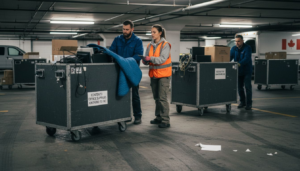Moving to a new home is an exciting adventure, but the process can be daunting. Among the many questions that come up, one of the most common is, “How much do residential movers cost?” If you’re gearing up for a move and pondering this question, you’re in the right place. Let’s dive into the factors that affect moving costs and give you a clearer picture of what to expect.
Understanding the Basics
First things first, let’s break down the basics. The cost of hiring residential movers depends on several factors, including the size of your move, the distance to your new home, and any additional services you might need. Here’s a closer look at each of these factors.
1. Size of the Move
The size of your move plays a significant role in determining the cost. Movers often charge based on the number of rooms or the overall volume of your belongings. If you’re moving from a one-bedroom apartment, you’ll likely pay less than someone relocating from a five-bedroom house. Here’s a rough estimate:
- Studio or One-Bedroom Apartment: $300 – $500 for a local move.
- Two-Bedroom Apartment or House: $500 – $800 for a local move.
- Three-Bedroom House: $800 – $1,500 for a local move.
- Larger Homes: $1,500 and up for a local move.
2. Distance of the Move
Are you moving across town, to a different state, or even across the country? The distance of your move significantly impacts the cost. Local moves are generally charged by the hour, while long-distance moves are often priced based on the weight of your items and the distance traveled.
- Local Moves: Typically charged by the hour, ranging from $50 to $200 per hour, depending on the number of movers and the region.
- Long-Distance Moves: Usually calculated based on weight and mileage. Expect to pay around $2,000 to $5,000 for a long-distance move, but this can vary widely.
3. Additional Services
Movers offer a range of additional services that can add to your overall cost. Some of these services include:
- Packing and Unpacking: If you opt for professional packing services, expect to pay extra. This can range from a few hundred dollars to over a thousand, depending on the amount of stuff you have.
- Specialty Items: Moving pianos, antiques, or other specialty items can incur additional fees due to the extra care and equipment required.
- Storage: Need to store your belongings temporarily? Many moving companies offer storage solutions, which will add to your costs.
- Insurance: Basic liability coverage is often included, but you might want to purchase additional insurance for added peace of mind.
Are you curious about “Does a Piano Need to Be Tuned After Moving?” Visit our blog page to learn all about it today!
Hidden Costs to Watch Out For
While it’s essential to understand the primary factors affecting moving costs, it’s equally important to be aware of potential hidden costs. These can sneak up on you if you’re not careful.
1. Travel Fees
Travel fees can add up, especially for long-distance moves. These fees cover the cost of fuel and the time it takes for the movers to travel to your home. Be sure to ask your moving company about any travel fees they charge.
2. Moving Supplies
Boxes, tape, bubble wrap, and other moving supplies can add to your costs. While some moving companies include basic supplies in their estimates, others do not. You can save money by sourcing your own supplies or asking friends and family for extras.
3. Gratuities
Tipping your movers is customary, especially if they do an excellent job. Plan to tip $20-$40 per mover for a local move and $50-$100 per mover for a long-distance move. This might not seem like much, but it can add up.
4. Extra Charges for Difficult Moves
If your home has challenging access, such as narrow stairways or long carrying distances from the truck to your door, you may incur extra charges. Be sure to discuss any potential obstacles with your movers beforehand to get an accurate estimate.
Saving Money on Your Move
Moving doesn’t have to break the bank. Here are some tips to help you save money without sacrificing the quality of service.
1. Get Multiple Quotes
One of the best ways to save money is to shop around. Get quotes from at least three different moving companies. This will give you a better sense of the market rate and help you find the best deal. Be wary of quotes that seem too good to be true, as they often are.
2. Move During the Off-Season
Moving companies are busiest during the summer months and at the beginning and end of each month. If possible, schedule your move during the off-season (fall and winter) or mid-month to get better rates and more availability.
3. Declutter Before You Move
The less you have to move, the less it will cost. Take the time to declutter your home before you start packing. Donate, sell, or discard items you no longer need. Not only will this save you money, but it will also make unpacking easier.
4. Do Some of the Work Yourself
Consider handling some of the tasks yourself, such as packing, disassembling furniture, or moving smaller items. The more you do on your own, the less you’ll have to pay the movers. Just be sure not to take on more than you can handle, as moving can be physically demanding.
Choosing the Right Moving Company
With so many moving companies out there, choosing the right one can be overwhelming. Here are some tips to help you make the best choice.
1. Research and Read Reviews
Take the time to research moving companies in your area. Read reviews on websites like Yelp, Google, and the Better Business Bureau. Pay attention to any recurring themes, such as positive experiences with customer service or frequent complaints about hidden fees.
2. Verify Credentials
Ensure the moving company you choose is licensed and insured. In the U.S., interstate movers must be registered with the Federal Motor Carrier Safety Administration (FMCSA). You can check a company’s registration and complaint history on the FMCSA website.
3. Get Everything in Writing
When you receive a quote, make sure it includes all potential charges and fees. Get a written estimate that outlines the services provided and the total cost. This will help prevent any surprises on moving day.
4. Ask Questions
Don’t be afraid to ask questions. Inquire about the company’s experience, their process for handling damages, and what measures they take to protect your belongings. A reputable moving company will be happy to answer your questions and provide the information you need.
Conclusion
The cost of residential movers can vary widely based on several factors, including the size and distance of your move, as well as any additional services you require. By understanding these factors and being aware of potential hidden costs, you can better plan and budget for your move. Remember to get multiple quotes, declutter before you move, and choose a reputable moving company to ensure a smooth and cost-effective transition to your new home.
Moving might be a daunting task, but with the right preparation and knowledge, you can make it an exciting and stress-free experience. Curious about how much residential movers cost? Find out with Aleks Moving, where we offer transparent pricing and top-notch service. Our experienced Etobicoke movers ensure a hassle-free move, making your transition smooth and efficient. Contact Aleks Moving today for a personalized quote and see how affordable quality moving can be. Trust us to handle your move with care and professionalism.



